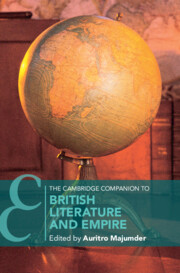Refine search
Actions for selected content:
507 results
Chapter 13 - Some Dialectics of Utopia in China Miéville’s Bas-Lag Trilogy
- from Part IV - Case Studies
-
-
- Book:
- The Cambridge Companion to British Utopian Literature and Culture since 1945
- Published online:
- 18 December 2025
- Print publication:
- 31 January 2026, pp 270-287
-
- Chapter
- Export citation
Conclusion
-
- Book:
- Peasants to Paupers
- Published online:
- 24 December 2025
- Print publication:
- 29 January 2026, pp 226-240
-
- Chapter
-
- You have access
- Open access
- HTML
- Export citation
Epilogue
-
- Book:
- Ottoman Reform at Work
- Published online:
- 19 December 2025
- Print publication:
- 29 January 2026, pp 268-272
-
- Chapter
- Export citation
19 - Ramy Ditzanny and Hebrew Poetry of the 1980s: Historiography, Nationalism, and Global Capitalism
- from Part III - Hebrew In The ‘Post’ Era
-
-
- Book:
- A History of Modern Hebrew Literature
- Published online:
- 19 December 2025
- Print publication:
- 22 January 2026, pp 385-414
-
- Chapter
- Export citation
11 - Zelda’s Shabbat, a Materialist Reading
- from Part II - Territorial Dimensions
-
-
- Book:
- A History of Modern Hebrew Literature
- Published online:
- 19 December 2025
- Print publication:
- 22 January 2026, pp 212-232
-
- Chapter
- Export citation
Sewing machines, intercommunal violence, and the economic order of things in the late Ottoman empire
-
- Journal:
- Journal of Global History , First View
- Published online by Cambridge University Press:
- 26 December 2025, pp. 1-18
-
- Article
-
- You have access
- Open access
- HTML
- Export citation
Introduction
-
- Book:
- Empires of Labor
- Published online:
- 30 November 2025
- Print publication:
- 18 December 2025, pp 1-34
-
- Chapter
- Export citation
Chapter 19 - The Enemy Within
- from Part V - The People Now
-
-
- Book:
- 'The People' and British Literature
- Published online:
- 11 December 2025
- Print publication:
- 11 December 2025, pp 306-322
-
- Chapter
- Export citation

Five Economies of World Literature
-
- Published online:
- 09 December 2025
- Print publication:
- 29 January 2026
2 - Trade, Race, and Class in Early Modern England
- from Part I - Early Intimations and Literary Genres: 1500–1800
-
-
- Book:
- The Cambridge Companion to British Literature and Empire
- Published online:
- 20 November 2025
- Print publication:
- 04 December 2025, pp 36-49
-
- Chapter
- Export citation
Welcome to the age of longevity capitalism
-
- Journal:
- Finance and Society ,
- Published online by Cambridge University Press:
- 04 December 2025, pp. 1-9
-
- Article
-
- You have access
- Open access
- HTML
- Export citation

The Cambridge Companion to British Literature and Empire
-
- Published online:
- 20 November 2025
- Print publication:
- 04 December 2025
Remembering Rochdale: The Cooperative Movement and the Post-Enclosure Atlantic
-
- Journal:
- International Labor and Working-Class History , First View
- Published online by Cambridge University Press:
- 20 November 2025, pp. 1-18
-
- Article
-
- You have access
- Open access
- HTML
- Export citation
Conclusion
-
- Book:
- Debts Unpaid
- Published online:
- 04 November 2025
- Print publication:
- 20 November 2025, pp 213-218
-
- Chapter
- Export citation
4 - Black Marxists and the Character of an African Leninist Economy
- from Part II - Socialist Dreams
-
- Book:
- Socialist De-Colony
- Published online:
- 10 November 2025
- Print publication:
- 20 November 2025, pp 165-200
-
- Chapter
-
- You have access
- Open access
- HTML
- Export citation
10 - From Estrangement to Engagement, 1921–1933
-
- Book:
- Distant Friends and Intimate Enemies
- Published online:
- 30 October 2025
- Print publication:
- 20 November 2025, pp 196-218
-
- Chapter
- Export citation
Hussain on the Market: Critique or Kvetch?
-
- Journal:
- Canadian Journal of Philosophy , FirstView
- Published online by Cambridge University Press:
- 14 November 2025, pp. 1-17
-
- Article
-
- You have access
- Open access
- HTML
- Export citation
8 - Next Stages
-
- Book:
- Moral Imagination in the Twenty-first Century
- Published online:
- 30 October 2025
- Print publication:
- 13 November 2025, pp 157-172
-
- Chapter
- Export citation
5 - Capitalism
-
-
- Book:
- Explaining the History of American Foreign Relations
- Published online:
- 24 October 2025
- Print publication:
- 13 November 2025, pp 103-120
-
- Chapter
- Export citation
The Kantian Critique of Marx’s Property Theory
-
- Journal:
- Kantian Review , First View
- Published online by Cambridge University Press:
- 13 November 2025, pp. 1-19
-
- Article
- Export citation
